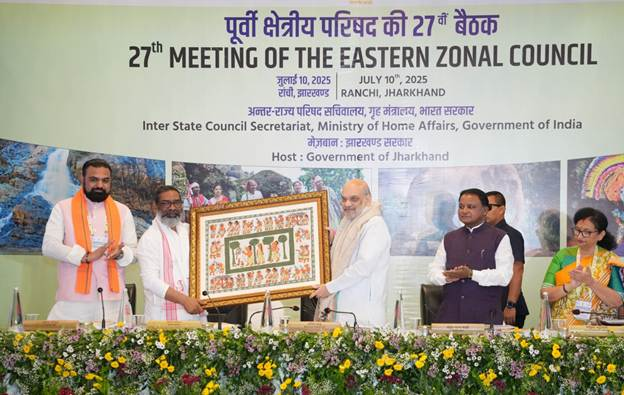27th Eastern Zonal Council Meeting Sets Bold Targets for Unity, Safety, Growth
The Eastern Zonal Council is one of five such zonal councils established under the States Reorganisation Act, 1956, intended to promote inter-state cooperation and coordination.

- Country:
- India
In a powerful demonstration of cooperative federalism and regional unity, Union Home Minister and Minister of Cooperation Shri Amit Shah chaired the 27th meeting of the Eastern Zonal Council in Ranchi, Jharkhand, on July 10, 2025. The high-level gathering brought together senior leadership from Bihar, Jharkhand, Odisha, and West Bengal, marking a pivotal step toward resolving inter-state issues and accelerating the development of eastern India.
The meeting was hosted at Ranchi under the aegis of the Inter-State Council Secretariat, Ministry of Home Affairs, in collaboration with the Government of Jharkhand. The Eastern Zonal Council is one of five such zonal councils established under the States Reorganisation Act, 1956, intended to promote inter-state cooperation and coordination.
Participants and Dignitaries
The meeting saw the presence of several high-ranking state leaders:
-
Jharkhand Chief Minister Shri Hemant Soren
-
Odisha Chief Minister Shri Mohan Charan Majhi
-
Bihar Deputy Chief Minister Shri Samrat Choudhary
-
West Bengal Finance Minister Smt. Chandrima Bhattacharya
-
Chief Secretaries and senior officials from all four states
-
Senior officials from various Central Ministries
Tribute to Forces and Operation Sindoor
Shri Amit Shah opened his address by lauding the valour of Indian security forces during Operation Sindoor, which recently showcased the nation’s operational precision and commitment to internal security. The Council passed a unanimous resolution of appreciation for the bravery of Indian forces.
“The world has witnessed the courage and strategic brilliance of our forces. Under Prime Minister Shri Narendra Modi’s leadership, India has shown unwavering resolve against terrorism,” said Shri Shah.
Celebrating Eastern India’s Historic and Cultural Legacy
In a sweeping tribute to eastern India's historic and cultural legacy, Shri Shah emphasized that the region has long been a cradle of freedom, education, spiritualism, and scientific innovation. He recalled the legacy of stalwarts like:
-
Bhagwan Birsa Munda
-
Netaji Subhas Chandra Bose
-
Swami Vivekananda
-
Dr. Rajendra Prasad
-
Babu Jagjivan Ram
Shri Shah described eastern India as a “confluence of cultural consciousness, devotional fervor, and revolutionary zeal.”
TEAM BHARAT and Cooperative Federalism
A major highlight of the Minister’s speech was the endorsement of Prime Minister Modi’s vision of “TEAM BHARAT”, emphasizing that India’s development must be driven through the progress of its states. He called on all member states to align with the national vision of a “Viksit Bharat by 2047”.
“Zonal Councils are no longer just forums for dialogue—they are now engines of cooperation and action,” said the Home Minister.
He noted a remarkable increase in the frequency and effectiveness of zonal council meetings:
-
2004–2014: 25 meetings held
-
2014–2025: 63 meetings held
-
Issues resolved: 1,287 out of 1,580 (83%)
This, according to Shri Shah, reflects the efficiency and output-oriented mindset of governance under the Modi administration.
Key Issues Discussed
The 27th Eastern Zonal Council meeting tackled long-standing and complex issues, including:
-
Masanjore Dam, Taiyabpur Barrage, and Indrapuri Reservoir
-
Division of assets and liabilities between Bihar and Jharkhand
-
Implementation of three new criminal laws in the eastern states
-
Counter-narcotics operations, including district-level NCORD meetings
-
Modernizing skill training beyond traditional frameworks
-
Fast Track Special Courts (FTSCs) for crimes against women and children
-
Emergency Response Support System (ERSS-112) implementation
-
Banking access in rural areas
-
Regional concerns in nutrition, health, education, power, urban planning, and cooperative institutions
Target: Naxalism-Free India by 2026
In one of the meeting’s most impactful statements, Shri Shah announced the central government's commitment to completely eradicating Naxalism by March 31, 2026.
“We have achieved unprecedented success in combating Naxalism due to the unity of states and the bravery of our security forces,” he said.
He noted that Bihar, Jharkhand, and Odisha have largely been freed from the influence of Naxal groups, while West Bengal is already Naxal-free.
Structural Role of Zonal Councils
Zonal Councils were instituted under Sections 15 to 22 of the States Reorganisation Act, 1956. Each council is chaired by the Union Home Minister, with Chief Ministers and nominated state ministers as members. One state Chief Minister acts as Vice-Chairman on a rotating basis.
Each council is supported by a Standing Committee of Chief Secretaries, where state proposals are first vetted before being taken up for formal council meetings.
A Template for Regional Unity and National Growth
The 27th Eastern Zonal Council meeting has reaffirmed the power of cooperative federalism in addressing both legacy and emerging challenges. From Naxalism to criminal justice reforms, from irrigation disputes to skilling strategies, the Council demonstrated how consensus and collaboration can accelerate India's developmental trajectory.
As Shri Shah concluded, “Zonal Councils are the living embodiment of India’s unity in diversity, and under TEAM BHARAT, they will continue to guide the nation toward a future that is secure, just, and prosperous for all.”










